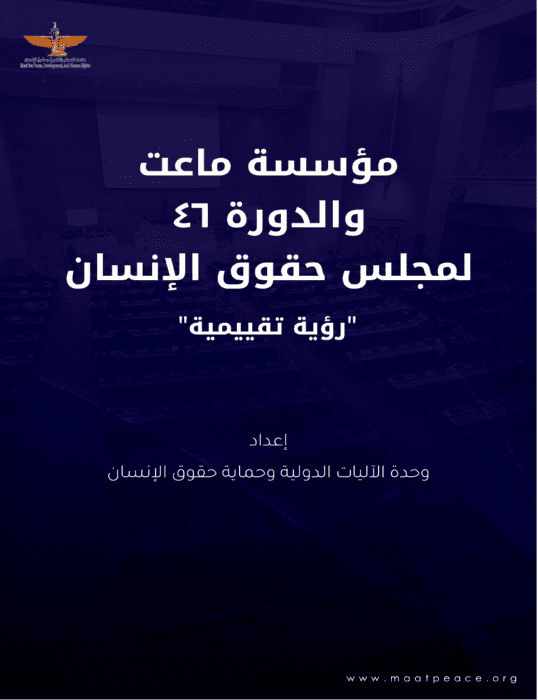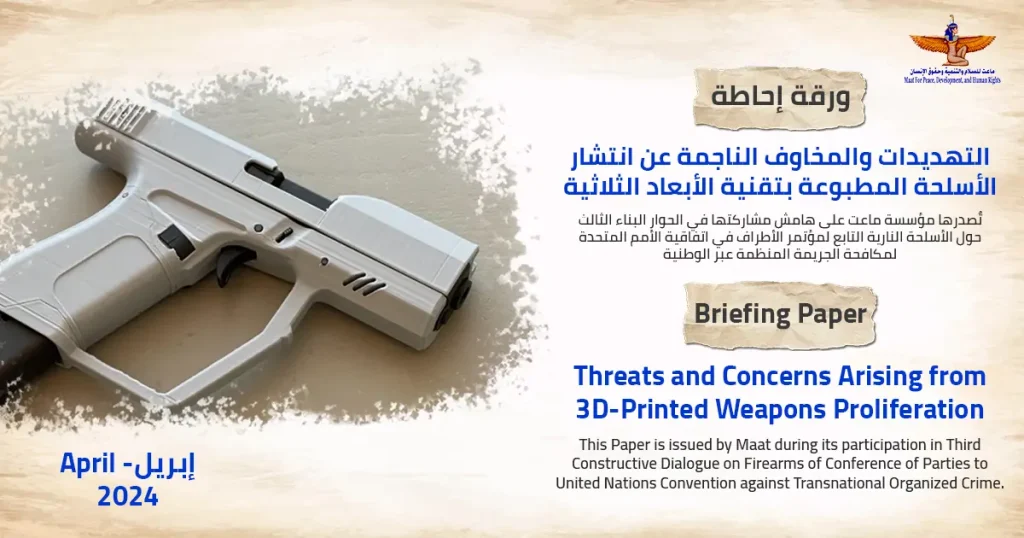Akil: The Corona pandemic has allowed small organizations to participate in the work of the Human Rights Council
Menatullah Bakr: Countries should not involve the International Council in political disputes between them
The Maat Foundation for Peace, Development and Human Rights issued a new report entitled “Maat Foundation and the 46th session of the Human Rights Council ... an evaluation vision,” which provided an extensive analysis of the work of the 46th session of the Human Rights Council, in light of the precautionary measures that occurred on the Council's work due to the Covid pandemic. 19 The pandemic caused restrictions on gathering, and the report reviewed the draft decisions that were voted on during the session, in addition to providing an analytical vision of the council’s policy towards the participation of civil society in public discussions and informal consultations. The report also included the participation of the Maat Foundation during the session’s work in addition to The Foundation's recommendations to the Presidency of the Human Rights Council that would enhance the participation of civil society in decision-making and protect human rights within the work of the Human Rights Council.
For over a month, the UN Human Rights Council held its 46th session from 22 February 2021 to 24 March 2021. Maat, along with other human rights, regional and international organizations, participated in this session with a number of written and oral interventions, to highlight the developments of the human rights situation in the Middle East and African countries, with a special emphasis on ensuring accountability and liability for human rights crimes committed in these regions.
The report pointed out that during the 46th session of the Human Rights Council, 15 Qatari decisions were submitted, 11 of whom were subject to voting, as 4 resolutions related to the human rights situation in Palestine / Israel were submitted, followed by two resolutions in southern Sudan. As for thematic decisions, 16 were submitted, of which 12 were subject to approval without a vote. 4 Of the decisions that were not subject to the vote were decisions to extend and expand the mandates of special procedures (Special Rapporteurs) such as the decisions of “Human Rights and the Environment”, “Cultural Rights”, “Albinism”, and “Privacy”. Three other decisions fall under the umbrella of economic, social and cultural rights in general, such as the decisions of "the right to food", "vaccinations", and "the issue of achieving economic and social rights." Four other decisions focus on political and civil rights, such as the decision on “Freedom of Religion and Belief”, “Human Rights and Democracy, and the Rule of Law”, “Torture”, and “Combating Intolerance”, and finally the decision on the 10-year lapse of the voluntary fund for supporting the participation of small states In the work of the Human Rights Council. As for the resolutions that have been voted, they are the decisions on “beneficial cooperation for all” provided by China, “illicit funds” provided by Cameroon, “foreign debt impact” provided by Cuba, and “coercive measures” provided by Azerbaijan.
Ayman Aqil, head of Maat Foundation, said that the Human Rights Council's permission for organizations and countries to participate in the council's work via video is a welcome policy in light of limiting gatherings and applying health care frameworks to limit the spread of the Coronavirus, and that it respects health procedures in the host country. Aqeel added that the video participation gave the opportunity to small organizations that were unable to afford the costs of participating in travel, which reinforces the principle of giving opportunities to hear all the different voices and opinions on all human rights issues at the international level, as in the past, there were very severe difficulties in the process of recording interventions And video messages to organizations, and that was a very complex process, and this had a great impact on limiting the ability of small organizations to participate, as it was necessary to travel and attend in person for representatives of the organizations to deliver their interventions. This is a major cost for travel and accommodation during the convening period and a financial burden on the shoulders of small organizations, newly established and limited funding from civil society actors locally and internationally.
For her part, Mennat Allah Bakr, Director of the International Mechanisms Unit for the Protection of Human Rights at Maat Foundation, stressed the need for international solidarity on the part of all countries, the UN mechanisms, and the Council, to prevent any kind of intimidation and intimidation speech, or incitement to hatred against representatives of civil society organizations and advocacy human rights bodies. Bakr called for the necessity of separating the policies of states and human rights, and that all states and organizations should not engage the council in any political disputes between states, and the necessity for all international mechanisms to be free from political bickering and conflict between state parties, as we are in the Maat Foundation we believe in the necessity A complete separation between politics and human rights, because this Council, when it was established, was with the aim of operating as an international mechanism to help states commit to respect and protect human rights in their diversity, and it is not an arena for political negotiation, or highlighting political and diplomatic disputes between states parties, as we are witnessing at this time.
To view the report via the following link: -
https://maatpeace.org/ar/?p=32696











